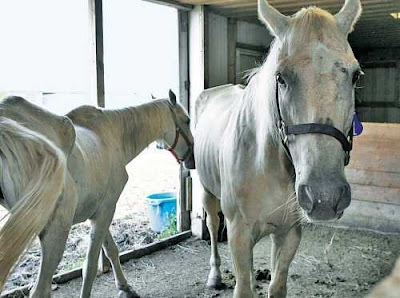I not only think everyone should read it, but if you have a personal experience to share involving this case, I'd like to hear from you, too.
Horse friends and associates;
Last spring I emailed many (if not all) of you when the media frenzy covering the seizure of horses in Grass Lake broke and I realized that I personally knew Matt Mercier, one of the young men charged in the case. Having shown with him at Spur of the Moment Horse Shows; having seen his horses, their willing attitude and affection for him; their healthy condition and witnessed first hand his consideration for his horses... the belief I shared in my email—that the charges being brought against these young men were not only suspect, but had to be inherently wrong—was validated several months ago.
If you have not been following the continued Grass Lake horse seizure—or been enlightened—the front page of the Farm Bureau newsletter disclosed earlier this year that all charges were dropped against Matt Mercier and Jim Henderson. Subsequent court decisions concluded the seizure was conducted without any basis in fact, and the return of their horses and property (or value) was ordered. However, Matt and Jim are still subjected to animosity from the uneducated public because the mass media has not sensationalize the truth like it did the falsehood.
With the charges dropped, rather than owning up and acknowledging they made a serious mistake, Jackson County Animal Control—using our public donation and tax dollars intended to provide for needy animals—is now taking a different direction to circumvent making restitution and admitting their actions were completely, totally and irresponsibly WRONG. Now, they are pursuing legal steps that jeopardize anyone who owns livestock. The results could give animal "shelters" more power and autonomy to make subjective decisions for privately owned farms and how we provide for our animals, and justify (and absolve) their misconduct in the Grass Lake seizure or the repeat of such.
Livestock and farm owners have to galvanize into action before this goes back to court in January! If WE don't keep people with limited knowledge about our animals and farms from making more arbitrary decisions and laws FOR us, the farms and horses that are lost tomorrow will be our own. Please contribute a few minutes of your time to write a letter; forward contact information for helpful sources for others to send letters to, and forward this email to your horse and farm associates for OUR mutual protection!
SINCERELY,
Gerry Eaton
This is exactly the kind of material that is needed to share and forward that will help spread the word about this case and motivate others to get involved. Thanks, Gerry.
To get involved, e-mail your letter to xpbuttercup@gmail.com and jdocpony@yahoo.com so we can share more testimonials with the public.
May the good you do today benefit us all tomorrow.







